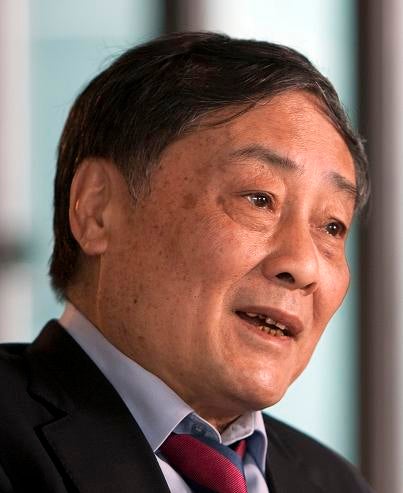
Twenty-five years ago, when Zong Qinghou was 42, he made his living selling soda and popsicles to schoolchildren.
He says he earned about $8 a month — less than a third of China's average wage at the time — and was so broke that he once slept in a tunnel under the streets of Beijing rather than spend on a hotel.
Today, Zong, 67, is still selling soft drinks — and lots of other things — as the wealthiest man in mainland China.
His net worth of $20.1 billion as of Oct. 5 ranks him No. 30 in the world, according to the Bloomberg Markets magazine. Supermarkets stock the juice, soda and bottled water his Hangzhou Wahaha Group produces, and doting Chinese parents buy his baby formula and children's clothes. In all of Asia, only Hong Kong property developers Li Ka-shing and Lee Shau-kee and Indian industrialist Mukesh Ambani are richer.
Even in a country that has exploded in wealth and created a new economic ruling class, Zong's story stands out. His rags-to-riches tale is remarkable not just for its trajectory but for the way he has thrived amid China's seemingly impossible conflation of capitalism and communism.
Zong, who didn't attend high school, lived on a farm commune from 1964 to 1978 during Mao Zedong's Cultural Revolution. He read the Communist revolutionary's books on leadership and learned about enduring through struggle. After Deng Xiaoping, the architect of China's drive toward a market economy, came to power, Zong took over a grocery store in 1987 with two retired teachers and a $22,000 loan from relatives.
Now Wahaha's chairman, Zong remains a frugal and autocratic manager, traits he honed in approving his first shop's every expense, down to the purchase of a broom. He often sleeps in a sixth-floor office at Wahaha's gray headquarters in Hangzhou, the capital of Zhejiang province. For lunch, he heads downstairs to the canteen, furnished with formica tables, where he eats the same food as his workers.
"When you are poor, you'll have to think of ways to be better off," says Zong, recalling his early years while chain-smoking Davidoff cigarettes outside Beijing's News Plaza Hotel. "That experience helps me to endure."
Wahaha, which means laughing baby in Mandarin, generated $11 billion in sales last year, with a 7.2 percent share of China's soft drink market. Flavored, nutritionally enhanced milk caters to families with young kids, while mineral water and iced green teas target adults.
Wahaha is No. 3, behind Coca-Cola Co. and Hong Kong- listed Tingyi (Cayman Islands) Holding Corp., according to London-based Euromonitor International Plc. Zong estimates that earnings at his closely held Wahaha will soar 60 percent to $1.6 billion this year from $1 billion in 2011.
Such a surge would make Zong even richer. He and his wife, Shi Youzhen, and their daughter, Kelly Zong, hold about 80 percent of the company. Zong disclosed the stake to Bloomberg News in September, more than doubling previous estimates of his wealth. (Bloomberg Markets magazine ranking operates under the rule that billionaire fortunes are inherently family fortunes.)
Zong's net worth is based on the average enterprise value-to-sales and price-to-earnings multiples of three publicly traded peers, using Wahaha's profits, plus $1.9 billion in cash from estimated dividends, market performance and taxes.
Zong is likely to use his status as China's richest person to pursue acquisitions overseas, says Zhang Lu, an analyst at Capital Securities Corp.
"Given the fact that Wahaha is already a well-known brand domestically, disclosing his share and wealth would help to boost the global profile of both Wahaha and Zong himself," she says.
Zong was born in 1945, a pivotal year in modern Chinese history. World War II had just ended and the nation was convulsed by civil war among Mao's Communists, Chiang Kai-Shek's Nationalist Party and independent military armies led by regional warlords. Zong's grandfather worked for a warlord, which later hurt the family's status after the Communists took over in 1949.
In the late 1950s, Mao ordered 700 million people into a state-controlled worker program dubbed the Great Leap Forward. By the early 1960s, the Great Leap had failed, leading to the deadliest famine in history, according to Jung Chang and Jon Halliday's 2005 book, "Mao: The Unknown Story."
In the mid-1960s, Zong, like millions of young Chinese, was forced to join a farming commune before Mao launched his second campaign, the Cultural Revolution.
"For a long time, I couldn't even afford food and clothing," Zong says of his years on the farm. "I climbed from the very bottom of the society."
Zong's time on the commune ended only after Mao died in 1976 and China gradually adopted the more-liberal policies engineered by Deng. Zong went to work as a salesman for consumer-goods companies as the country suffered shortages in the staples Chinese were clamoring for: meat, bicycles and TV sets.
One of the companies Zong sold for was a beverage maker that ran a shop owned by a grade school in Hangzhou. He and two retired teachers took over the store in 1987, the first step in creating Wahaha. He spent the next two and a half decades expanding from China's cities to rural areas, where disposable income was accelerating and competition was less fierce.
Zong named daughter Kelly to head Wahaha's nascent international business in 2010. Zong says she'll take over when he retires, although he has no plans to do so.
Now that he's a billionaire, Zong says, he wants to help other Chinese prosper.
"People who get rich early should help the rest get rich," he says, referring to words attributed to Deng.
Subscribe to Independent Premium to bookmark this article
Want to bookmark your favourite articles and stories to read or reference later? Start your Independent Premium subscription today.

Join our commenting forum
Join thought-provoking conversations, follow other Independent readers and see their replies